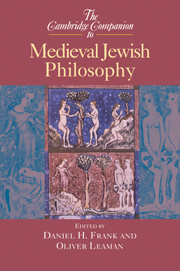Book contents
- Frontmatter
- PART I BACKGROUND AND CONTEXT
- PART II IDEAS, WORKS, AND WRITERS
- 4 Saadya and Jewish kalam
- 5 Jewish Neoplatonism
- 6 Judah Halevi and his use of philosophy in the Kuzari
- 7 Maimonides and medieval Jewish Aristotelianism
- 8 Maimonides and the sciences
- 9 Medieval Jewish political thought
- 10 Judaism and Sufism
- 11 Philosophy and kabbalah
- 12 Arabic into Hebrew
- 13 Philosophy in southern France
- 14 Conservative tendencies in Gersonides’ religious philosophy
- PART III THE LATER YEARS
- Guide to further reading in English
- Index
7 - Maimonides and medieval Jewish Aristotelianism
from PART II - IDEAS, WORKS, AND WRITERS
Published online by Cambridge University Press: 28 May 2006
- Frontmatter
- PART I BACKGROUND AND CONTEXT
- PART II IDEAS, WORKS, AND WRITERS
- 4 Saadya and Jewish kalam
- 5 Jewish Neoplatonism
- 6 Judah Halevi and his use of philosophy in the Kuzari
- 7 Maimonides and medieval Jewish Aristotelianism
- 8 Maimonides and the sciences
- 9 Medieval Jewish political thought
- 10 Judaism and Sufism
- 11 Philosophy and kabbalah
- 12 Arabic into Hebrew
- 13 Philosophy in southern France
- 14 Conservative tendencies in Gersonides’ religious philosophy
- PART III THE LATER YEARS
- Guide to further reading in English
- Index
Summary
Moshe ben Maimon, better known in the West as Maimonides, falls temporally at the midpoint of the six-hundred-year history of medieval Jewish philosophy. But from the vantage point of the present he is a central figure in a much more significant way. Maimonides is a Janus-faced figure, looking both forward and backward. He is the culmination of the Judeo-Arabic philosophical tradition, which includes Saadya, Solomon ibn Gabirol, and Judah Halevi. But Maimonides also establishes the Jewish philosophical agenda in Christian lands from the thirteenth century on with the (posthumous) translation of his controversial Guide of the Perplexed into Hebrew. His influence in fact extends beyond Jewish philosophy, for his effect upon Christian thinkers such as Aquinas and Meister Eckhart is palpable. Even beyond the medieval period Maimonides is a pivotal figure, who provides a starting point for philosophical speculation. Spinoza has Maimonides in mind throughout his Tractatus Theologico-Politicus, published anonymously in 1670. And it is Maimonides to whom Hermann Cohen in the twentieth century turned in developing his own conception of Judaism as ethical monotheism. More than any other Jewish thinker before or after, Maimonides, known among his own people by the acronym Rambam, can reasonably lay claim to a place on any short list of great philosophers. This chapter will attempt to ground this bald claim.
- Type
- Chapter
- Information
- The Cambridge Companion to Medieval Jewish Philosophy , pp. 136 - 156Publisher: Cambridge University PressPrint publication year: 2003
- 7
- Cited by

